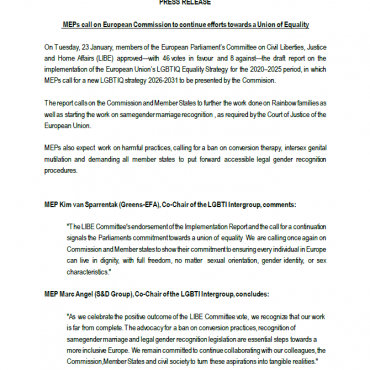Indian Supreme Court re-criminalises same-sex activity
India’s Supreme Court today ruled to re-criminalise same-sex intercourse. This major human rights setback means citizens in the 1.2 billion nation can again be arrested and prosecuted on the basis of consensual same-sex activity.

In July 2009, the Delhi High Court had ruled the colonial-era sodomy law unconstitutional. In Naz Foundation v. Govt. of NCT of Delhi, it argued that Section 377, which banned “carnal intercourse against the order of nature with any man, woman or animal”, was in direct violation of fundamental rights guaranteed by the Indian Constitution.
The Supreme Court overturned the Delhi High Court decision, re-criminalising consensual same-sex with potential imprisonment for life.
Supreme Court judges argued today this change was up to Parliament to make, not a High Court. However, activists fear Parliament will not legislate on this issue in the near future.
Sir Graham Watson MEP, Chair of the EU-India Parliamentary Delegation and Member of the LGBT Intergroup, reacted: “It is shameful that this colonial law, which we Britons are sadly responsible for, will enter into force again.”
“I call on our colleagues in the Parliament of India to take bold and urgent action, and finally repeal Section 377 for good.”
Ulrike Lunacek MEP, Co-President of the LGBT Intergroup, continued: “I am shocked by this major step back by the Indian Supreme Court. This doesn’t speak well of the world’s largest democracy, where LGBT people must be able to live their lives without fear of being arrested or prosecuted.”
“This is one closet door that won’t close again, and I’m confident Parliament will eventually overturn today’s ruling. All EU Member States and High Representative Catherine Ashton must insist on full decriminalisation of homosexuality immediately.”






